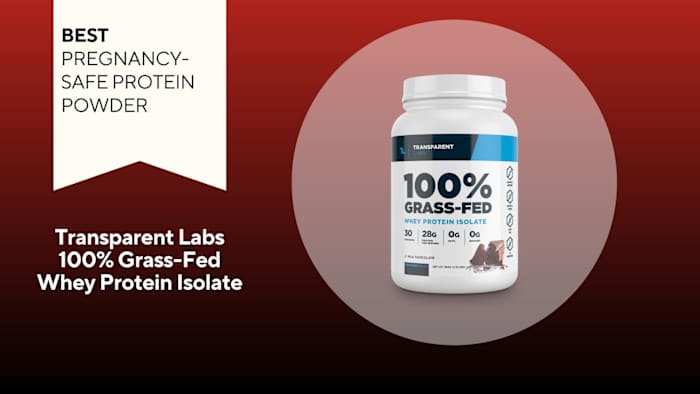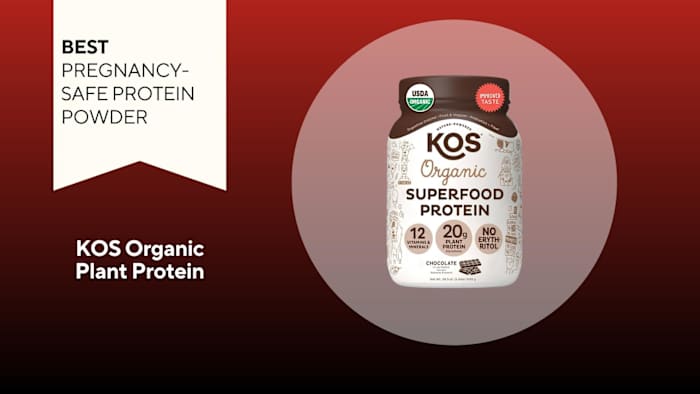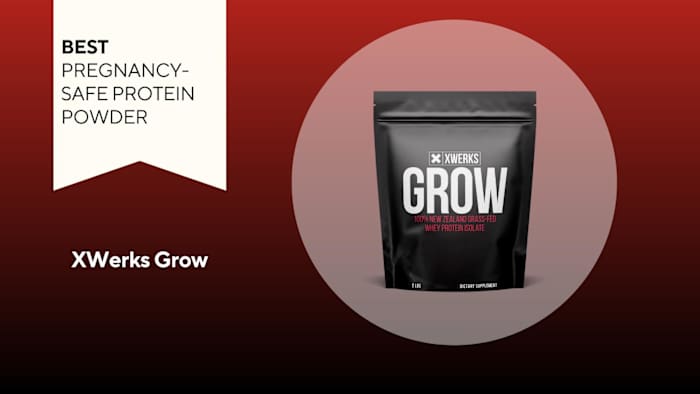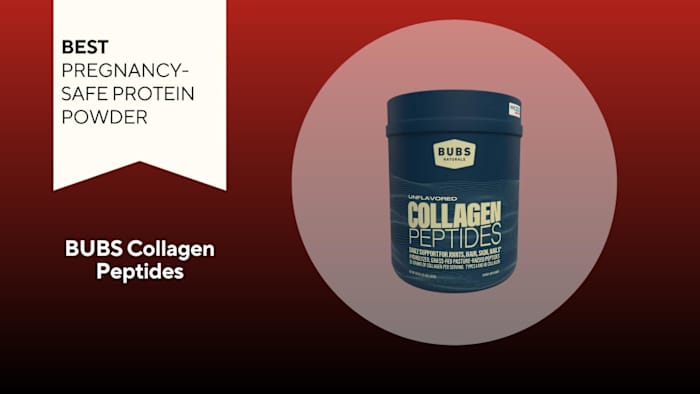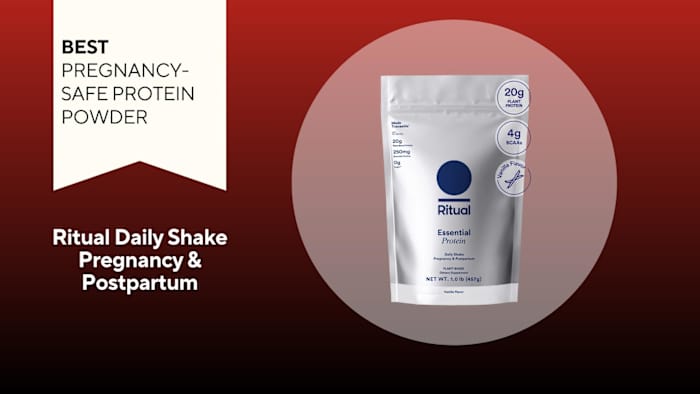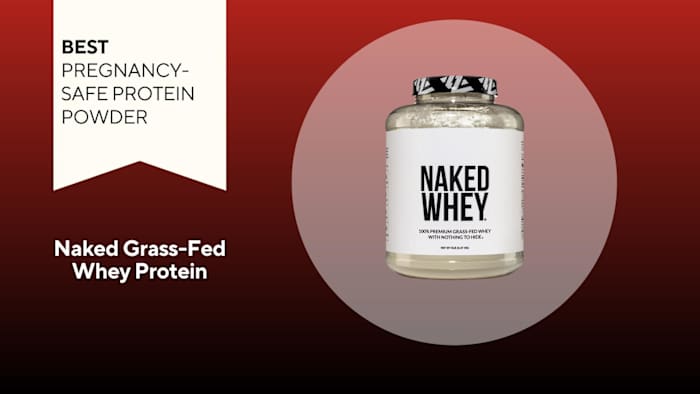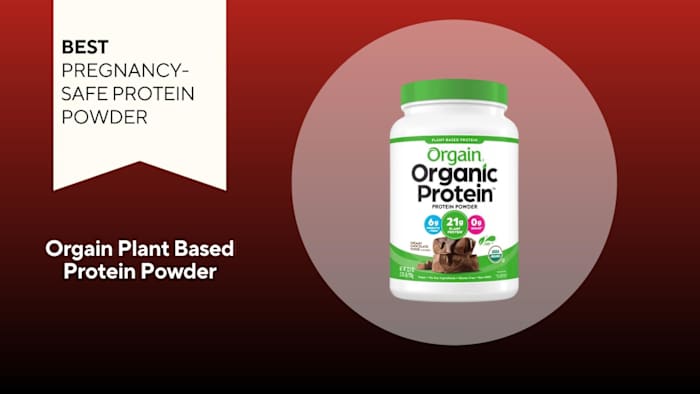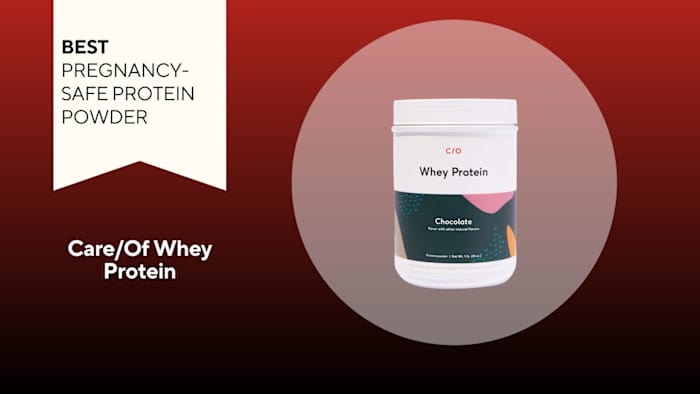The products featured in this article have been independently reviewed. When you buy something through the retail links on this page, we may earn commission at no cost to you, the reader. Sports Illustrated editorial staff are not involved in the creation of this content. Learn more here.
Nutrition is crucial when you’re pregnant, which is why doctors prescribe prenatal vitamins to those who are pregnant or trying to become pregnant. When you’re growing a baby, you need more nutrients, and that includes up to twice as much protein as you normally consume.
Pregnant people should consume at least 60 grams of protein per day, which is about 14 grams more than the amount recommended for those who aren’t pregnant. Some experts recommend levels of up to 70 grams or even 100 grams per day.
“A good rule of thumb for pregnant women is to aim for 80 to 100 grams per day. More specifically, the daily recommendation is 1.1 grams of protein per kilogram [of bodyweight],” Caitlin Goodwin, RN, Certified Nurse-Midwife says.
Most of your protein should come from your diet (lean meats, legumes, etc.), but protein powder for women who struggle to consume enough protein from diet alone is a safe option in a pinch. One great way to ensure you’re meeting the higher protein recommendations for pregnancy is by adding protein powder to your diet.
The following are the best protein powders for those who are pregnant in 2024, including a guide on what to look for when choosing a safe protein powder for your pregnancy.
This content is meant to be informative, but should not be taken as medical advice. It is not intended for use as diagnosis, prevention or treatment of health problems. Always speak with your doctor before starting any new supplement or exercise regimen.
Our Picks for Best Pregnancy-Safe Protein Powders in 2024:
- Transparent Labs 100% Grass-Fed Whey Protein Isolate
- KOS Organic Plant Protein
- XWerks Grow
- BUBS Collagen Peptides
- Ritual Daily Shake Pregnancy & Postpartum
- Naked Grass-Fed Whey Protein
- Orgain Plant Based Protein Powder
- Care/Of Whey Protein
Transparent Labs 100% Grass-Fed Whey Protein Isolate
Key features & specs:
- Serving size: 1 scoop (34 grams)
- Protein per serving: 28 grams
- Servings per container: 30
- Nutrition facts: 140 calories, 1 gram fat, 0 grams sugar, 3 grams carbohydrates
- Flavors: Chocolate Peanut Butter, Milk Chocolate, French Vanilla, Strawberry, Mocha, Vanilla Peanut Butter, Cinnamon French Toast, Oatmeal Chocolate Chip Cookie, Unflavored
- Certifications: Third-party tested by Analytical Resource Laboratories
- Sweeteners: Stevia extract
- Price per serving: $1.99
Transparent Labs is known for producing products with clean ingredients and full disclosure labels. The company backs up those claims by having its products regularly tested by a third party to ensure you’re getting products with the ingredients listed at the amounts on the nutrition label.
We like the 100% Grass-Fed Whey Protein Isolate because it packs 28 grams of protein in each serving—one of the industry’s highest protein-by-weight ratios and nearly half of the daily recommended protein for pregnant women.
Transparent Labs Whey Protein Isolate is sourced from 100 percent grass-fed cows. Research shows that grass-fed cows provide milk with a higher protein content and improved nutritional status. The powder also contains no artificial additives like preservatives or sweeteners.
Another plus: this protein powder comes in nine flavors, including Vanilla Peanut Butter, Cinnamon French Toast, Oatmeal Chocolate Chip Cookie, as well as Unflavored for those who prefer a plain powder. Consumers report that they love the clean ingredients, tasty flavors and that there is no aftertaste.
What we love:
- Third-party tested
- One of highest protein-per-serving protein shakes
- Wide variety of flavors
What to consider:
- Contains dairy products, which may not be suitable for users who are not tolerant to lactose
- Not a good option for those on a plant-based diet
KOS Organic Plant Protein
Key features & specs:
- Serving size: 2 scoops (30 grams)
- Protein per serving: 20 grams
- Servings per container: 28
- Nutrition facts: 160 calories, 6 grams fat, 2 grams sugar, 9 grams carbs
- Flavors: Chocolate, Blueberry Muffin, Chocolate Chip Mint, Chocolate Peanut Butter, Salted Caramel Coffee, Vanilla, Unflavored
- Certifications: Plant-based, gluten-free, dairy-free, soy-free, non-GMO, USDA Organic
- Sweeteners: Organic stevia extract
- Price per serving: $1.78
Named for the historic Greek island and birthplace of Hippocrates (the “father of medicine”), KOS embraces the Hippocratic approach to health through simplicity and purity. The company aims to get the whole world on board with a “plant-centric nourishment” lifestyle—and that begins with its nutritional supplements. We like KOS Organic Plant Protein powder for pregnant people because it’s packed with vitamins, including zinc, and folic acid, a B vitamin that helps protect developing fetuses from certain birth defects.
KOS Organic Plant Protein gets its protein from several organic sources, including peas, flax seeds, quinoa, pumpkin seeds and chia seeds. Just mix two scoops in eight to 12 ounces of cold water or a non-dairy drink and blend.
This protein powder comes in six flavors, plus an unflavored version. Some consumers rave that KOS is the best-tasting protein powder they've tried, and KOS is willing to back that up—the company offers a 60-day guarantee. You’ll get a full refund if the product doesn't meet your standards within 60 days.
What we love:
- Contains folic acid
- Available in seven flavors
- Made with five organic plant-based sources of protein
What to consider:
- No third-party testing listed on the website
- Higher in calories than many protein powders (which is normal for plant-based protein powders)
XWerks Grow
Key features & specs:
- Serving size: 1 scoop (32.5–37 grams)
- Protein per serving: 25 grams
- Servings per container: 30
- Nutrition facts: 110 calories, 0 grams fat, 0 grams sugar, 1 gram carbohydrates
- Flavors: Strawberry, chocolate, peanut butter, vanilla
- Certifications: Non-GMO, soy-free, third-party tested by Informed Sport
- Sweeteners: Organic stevia
- Price per serving: $2.03
According to our testers, XWerks Grow is one of the best tasting and mixable whey isolate protein powders. The ultra-fine, confectioners sugar-like texture of the powder also makes it the ideal protein powder to use in your favorite baked goods when pregnancy-related sweet tooth strikes.
This powder, a whey protein isolate, is one of the most efficient protein powder types in terms of carbs to protein ratio. With whey, you also get all nine of the essential amino acids in one serving, which boasts 25 grams of protein that are free of added sugar and artificial sweeteners. It also contains 21 percent of the daily recommended serving of calcium, and a modest serving of iron (800 mcg). Iron is especially important during pregnancy, since it helps your red blood cells move oxygen to your fetus.
This protein powder comes in four delicious flavors—strawberry, peanut butter, chocolate and vanilla—all of which are sweetened with organic stevia. Our testers rave about the taste. “I love protein powders in smoothies, but it’s rare to find a powder that doesn’t overwhelm or sully the taste. ” says SI Showcase writer Emma Witman. “The strawberry XWerks actually makes the flavor better in a fruity smoothie, and I love the chocolate flavor for making keto protein bombs.”
What we love:
- High protein
- Contains omega-3 fatty acids
- Suitable for those following a vegan or vegetarian diet
What to consider:
- Pricier than many protein powders
- Only two flavors available
BUBS Collagen Peptides
Key features & specs:
- Serving size: 1 scoop (34 grams)
- Protein per serving: 22 grams
- Servings per container: 30
- Nutrition facts: 130 calories, 2.5 grams fat, 0 grams sugar, 3 grams carbohydrates
- Flavors: Unflavored
- Certifications: Non-GMO, gluten-free, soy-free
- Sweeteners: None
- Price per serving: $1.77
For many, the only thing better than a protein powder that boasts an excellent taste is a protein powder with zero taste. That’s the case with BUBS Collagen Peptides, a tasteless, easily mixing protein powder, according to our testers.
Each serving of its protein powder delivers 18 grams of high-quality bovine-based protein. Collagen supplementation in particular has been touted for its bone-health benefits in studies on those with osteoarthritis.
Just note that collagen is not a complete protein. However, supplementing with collagen is still a fine option, since the bulk of your protein should come from a variety of foods, and those foods should ultimately cover all your bases in terms of getting all nine essential amino acids.
The collagen protein can be added to smoothies and shakes, blended into a favorite beverage or cooked into recipes for baked goods. And the best part: our tester says the flavor is undetectable.
What we love:
- Collagen offers additional health benefits
- Flavorless and easy to mix with anything
What to consider:
- Collagen doesn't offer a complete amino acid profile
- Not suitable for those following a vegan or vegetarian diet
Ritual Essential Protein Daily Shake Pregnancy & Postpartum
Get 25% off your first month of Ritual! Code: SI25
Key features & specs:
- Serving size: 1 scoop (30 grams)
- Protein per serving: 20 grams
- Servings per container: 15
- Nutrition facts: 115 calories, 2 grams fat, 0 grams sugar, 3 grams carbohydrates
- Flavors: Vanilla
- Certifications: Non-GMO, gluten-free, major allergen-free, vegan, third-party tested by Informed Sport
- Sweeteners: Reb-M (from fermented sugarcane) and monk fruit
- Price per serving: $2.66
When Ritual founder Katerina Schneider became pregnant, she set out to find the ideal prenatal vitamins and supplements, but she couldn't find brands she trusted. “I decided to build my own,” she says. Ritual is a supplement company focused on clean, traceable ingredients backed by science. The company sells a variety of dietary supplements and protein powders, including the popular Ritual Essentials Multivitamin and the Essential Protein Shake Pregnancy & Postpartum, designed especially for those who are pregnant and nursing.
Each serving of Ritual’s vegan protein powder for pregnancy contains 20 grams of organic pea protein and 250 milligrams of choline, an essential nutrient for both pregnant people and those who are breastfeeding. Choline has been shown to improve cognition, neural development and placental functioning, and it protects against neural and metabolic problems.
This protein is also non-GMO, gluten-free, vegan, free of major allergens and third-party tested. It comes in only one flavor, Vanilla. Customers say that the flavor is more complex, with layers of caramel and hints of spice. It’s sweetened with a combination of fermented sugarcane (Reb-M) and monk fruit, which gives it a touch of sweetness.
Related: The Best Postnatal Vitamins to Support New Moms
What we love:
- Third-party tested
- Good option for those with food sensitivities
- Contains choline for healthy pregnancy and lactation
What to consider:
- One of the more expensive protein supplements, at $2.66 per serving
- Comes in only one flavor
Naked Nutrition Grass-Fed Whey Protein
Key features & specs:
- Serving size: 2 scoops (30 grams)
- Protein per serving: 25 grams
- Servings per container: 76
- Nutrition facts: 120 calories, 2 grams fat, 2 grams sugar, 3 grams carbohydrates
- Flavors: Chocolate, Vanilla, Strawberry
- Certifications: Non-GMO, soy-free, gluten-free, no additives, Informed Choice Tested by Sport
- Sweeteners: Organic coconut sugar
- Price per serving: $1.60
Naked Nutrition aims to help consumers meet their nutrition and fitness goals with clean, simple products. And since many of their customers are athletes, they’re all about transparency. All of Naked Nutrition’s products are tested by Informed Sport—a monitoring program that certifies that a supplement has been tested for banned substances. It helps ensure purity of products so athletes make informed purchasing decisions.
Naked Nutrition Grass-Fed Whey Protein powder packs in 25 grams of protein from cows that are grass-fed, free-roaming and raised without hormones. The powder is cold-processed, which helps it retain pregnancy-friendly nutrients, amino acids and omega-3 fatty acids. It’s also free of GMOs, soy, gluten and additives.
Whey protein powder can be consumed any time of day, including before or after a workout. Mix the powder with water, milk or juice. You can also blend it with fruits, vegetables and/or nut butter for an extra boost of nutrients.
Related Post: Whey Protein vs. Whey Isolate: Which One is Right for You?
What we love:
- No artificial sweeteners, colors or preservatives
- Tested for banned substances
- Competitively priced for such a high-quality supplement
What to consider:
- Some consumers find the powder hard to blend
- Contains dairy products, which may not be suitable for some
Orgain Organic Protein Powder
Key features & specs:
- Serving size: 2 scoops (46 grams)
- Protein per serving: Up to 21 grams (varies by flavor)
- Servings per container: 20
- Nutrition facts: 150 calories, 4 grams fat, 0 grams sugar, 15 grams carbohydrates
- Flavors: Creamy Chocolate Fudge, Chocolate Coconut, Chocolate Caramel Sea Salt, Chocolate Peanut Butter, Peanut Butter, Natural Unsweetened, Vanilla Bean, Iced Coffee, Cookies ‘n Cream, Strawberries & Cream
- Certifications: Gluten-free, kosher, vegan, Non-GMO, USDA Organic, Certified Plant Based
- Sweeteners: Organic stevia, erythritol
- Price per serving: $1.42
Orgain is a company that’s not only committed to clean, doctor-developed powders, drinks and protein bars; it’s also kind to the environment and gives back to its communities. Orgain products’ packaging is designed to reduce environmental impact, and the company spearheaded programs such as Shakes for Heroes, which involved donating more than 100,000 protein shakes to healthcare workers on the front lines of the COVID pandemic.
Orgain’s Organic Protein Powder is a plant-based protein powder that packs up to 21 grams of protein and 35 percent of your DV of iron per serving. It’s also kosher, certified USDA organic and free of gluten, GMOs and artificial sweeteners.
There are 10 flavors available, including originals like Chocolate and Vanilla and dessert-inspired flavors like Chocolate Caramel Sea Salt and Strawberries & Cream. Consumer reviewers give the products high marks on flavor and mixability.
Related Post: Pea Protein vs. Whey: Which One Is Right for You?
What we love:
- Good option for those with food sensitivities
- Wide variety of flavors
- Company is environmentally friendly and philanthropic
What to consider:
- Not third-party tested
- Stevia may cause gastrointestinal distress and/or bloating for some
Care/Of Whey Protein
Key features & specs:
- Serving size: 2 scoops (28 grams)
- Protein per serving: 18 grams
- Servings per container: 15
- Nutrition facts: 100 calories, 0 grams fat, 4 grams sugar, 6 grams carbohydrates
- Flavors: Vanilla, Chocolate
- Certifications: Non-GMO, Certified C.L.E.A.N., gluten-free, third-party tested by “world-leading laboratories in the United States”
- Sweeteners: Organic monk fruit extract
- Price per serving: $1.86
Care/Of is a supplement company that promises to be honest and transparent with consumers, and crafts its products based on a review of existing research, evaluating criteria such as statistics, consistency of results, magnitude of results and methodology characteristics.
We like Care/Of’s grass-fed whey protein powder because it’s non-GMO, gluten-free and Certified C.L.E.A.N., meaning its ingredients comply with safety standards, are minimally processed, organically grown, humanely manufactured and have a high amount of bioavailable digestive enzymes.
Each 100-calorie serving of Care/Of Whey Protein has 18 grams of protein sourced from grass-fed cows, plus small amounts of calcium, potassium and magnesium. Calcium is especially important during pregnancy because it helps to build your fetus’s bones and teeth.
Care/Of sweetens this protein supplement with organic monk fruit extract, and offers two flavors: Vanilla and Chocolate. Consumers say the Vanilla is very subtle, and the Chocolate is more robust and even better when mixed with bananas and blueberries.
For more in-depth information about this supplement company, check out our Care/of review.
What we love:
- Third-party tested
- Good option for those with food sensitivities
- Low calorie
What to consider:
- Pricier than other proteins on our list
- High in carbs compared to other protein shakes
Is Protein Powder Safe for Pregnancy?
Protein powders can be safe for pregnant people if taken in moderation and if the product is tested for purity. "The primary concern about consuming protein powders during pregnancy is that supplements aren’t tested by the Food and Drug Administration (FDA), so using them comes at your own risk,” Goodwin says.
Many brands that sell protein powders have their products tested by third-party laboratories to ensure the purity of the ingredients and that they don’t contain unwanted ingredients or contaminants.
Some protein powders may contain ingredients that may not be safe during pregnancy, such as certain herbs, added caffeine or artificial sweeteners. Read the ingredient list carefully, and choose a protein powder that’s specifically designed for pregnant people or has been approved by your healthcare provider.
It’s important to remember that protein powders should not replace a healthy, balanced diet during pregnancy. A diet rich in whole foods—like fruits, vegetables, lean proteins and whole grains—is essential for the health of both the pregnant person and the baby. It’s always best to consult with your healthcare provider before consuming protein powder if you are expecting.
Benefits of Protein Powder During Pregnancy
Supports general health
Protein is necessary for growth and development, whether pregnant or not. “Protein is an essential macronutrient found in all parts of the body, made up of amino acids. It is necessary for the body's tissues and organs to be structurally and functionally sound, and plays a significant part in numerous biological processes,” says Veena Madhankumar, MBBS., MD, Obstetrician and Gynecologist,
Prenatal health
“An adequate protein intake is ideal because it may decrease the risk of intrauterine growth restriction or hypertensive disorders in pregnancy,” Goodwin says. Furthermore, Madhankumar adds that protein powders “can have a positive effect on the baby’s growth by supplying them with the needed nutrients. A proper amount of protein during pregnancy contributes to a baby’s birth weight, the size of its head and the well-being of the mother.”
Convenience
Protein powders can help those who are pregnant meet their increased protein requirements without cooking a full, protein-rich meal. “The best way to get protein is through food,” Madhankumar says. But for those who struggle to eat enough protein, supplemental powders help.
Easier to digest
Protein powders can be an easier way to meet protein needs for those who experience morning sickness or have difficulty consuming protein-rich foods. “Anyone struggling to consume the appropriate amount of daily protein due to nausea or dietary restrictions may consider supplementation,” Goodwin says.
Nutritious
Some protein powders may also contain other nutrients, such as iron, calcium and folic acid, which are important during pregnancy. “Pregnant women may already be taking prenatal vitamins, so be aware that added vitamins and minerals in a protein supplement may increase the acceptable dosage,” Madhankumar says.
Potential Risks of Using Protein Powder During Pregnancy
Harmful ingredients
Some protein powders may contain ingredients that could be harmful to those who are pregnant and the developing fetuses; these include caffeine, certain artificial sweeteners and some herbal supplements. It’s important to read the labels carefully and consult with a healthcare provider before taking any supplements during pregnancy.
Too much of a good thing
Very high levels of protein have been associated with an increased risk of preterm birth and low birth weight, Madhankumar says. Consult with your doctor or dietitian before consuming any protein supplements while pregnant.
Risk of contamination
Some protein powders may be contaminated with substances that may be harmful to fetuses, such as heavy metals or bacteria. Look for protein powder brands that have been tested by a third party to ensure safety and purity.
What to Look for When Choosing a Protein Powder for Pregnancy
Nutritional content
Protein powders should provide enough protein to support the 60 grams of daily protein a pregnant person needs. They should also contain other essential nutrients, such as vitamins, minerals and antioxidants.
Quality of protein
Protein powders for pregnancy should contain high quality and complete proteins, which means they should contain all nine essential amino acids, which the body cannot produce on its own.
Type of protein
Choose a protein powder that best suits your dietary preferences and needs. Some protein powders contain animal-based protein, such as whey or casein. Others are plant-based, such as pea protein, soy protein, hemp protein or rice protein. And some use collagen protein. “There are conflicting thoughts on using marine collagen during pregnancy due to the increased risk of high mercury levels in seafood,” Goodwin says. “However, collagen is an incredible source of protein.”
Safety and purity
Choose protein powder that has been tested for safety and purity to ensure it’s free from harmful contaminants, such as heavy metals, bacteria and other toxins. “Knowing if any specific protein is 100 percent ideal to consume during pregnancy is challenging,” Goodwin says. “However, performing research before buying and examining labels for quality markers, such as [those who use] independent lab testing, can reassure you that you are buying safer powders for your baby.”
Your doctor's recommendations
It’s best to consult with your doctor before taking any dietary supplements during pregnancy, including protein powder. Your doctor may provide you with personalized recommendations based on your individual needs and health status.
What to Avoid When Choosing a Protein Powder for Pregnancy
In general, when choosing a protein powder during pregnancy, it’s important to avoid certain ingredients and additives. Here are ingredients sometimes found in protein powders that pregnant people should avoid:
Artificial sweeteners
Some artificial sweeteners, such as saccharin (Sweet ‘N Low), are not recommended during pregnancy.
High levels of heavy metals
Some ingredient sources of protein powders may be contaminated with pesticides and heavy metals. Small levels of these contaminants are not considered harmful; however, high levels of lead, mercury or cadmium can be harmful to both mother and baby.
Additives
Caffeine, herbal extracts and other substances may not be safe for developing fetuses. Some added vitamins may give those who are pregnant and already taking prenatal vitamins more than they need, according to Madhankumar.
Unnecessary ingredients
Extra sugar, artificial flavors and synthetic colors are unnecessary ingredients and best avoided during pregnancy.
Allergens
Soy, wheat and dairy are common allergens, and may cause bloating and abdominal distress for pregnant people. It may be especially difficult for those in their first trimester who struggle with morning sickness.
Other Safe Sources of Protein for Pregnancy
The best source of protein is through a healthy diet. Great examples of daily food sources of protein include:
- Fish or seafood
- Liver
- Chicken
- Lean beef
- Lamb
- Pork
- Nuts
- Tofu
- Split peas
- Red and white kidney beans
- Black beans
- Navy beans
- Black-eyed peas
- Chickpeas (garbanzo beans)
Related: Protein Powder 101: The Comprehensive Guide to Using Protein Powder for Optimal Health and Fitness
How We Chose the Best Protein Powders for Pregnancy
We looked at a number of different factors to select the best protein powders for pregnant people, including expert input, research, ease of digestion, taste, third-party testing, price, online customer reviews, overall quality of ingredients and our own first-hand experience testing these products. There are plenty of protein powders on the market, but we wanted to see which provided the safest options with highest-quality nutrients that pregnant people need.
Protein Powder for Pregnancy FAQs
Are all protein powders safe for pregnancy?
No. Some protein powders contain ingredients that can be harmful to developing fetuses, such as caffeine, certain artificial sweeteners or contaminants.
Is whey protein O.K. during pregnancy?
Whey is a byproduct of milk. It’s O.K. to consume pasteurized whey during pregnancy provided you don’t have any dairy allergies.
What month should I start taking protein powder during pregnancy?
You can begin using protein powder any trimester during pregnancy, including before you become pregnant. Be sure to talk with your doctor before using it while pregnant or if you’re considering pregnancy to ensure it’s O.K. for your health and dietary needs.
Takeaway: Is Protein Powder During Pregnancy Safe?
Protein is an essential part of a healthy diet, and it’s especially important for those who are pregnant. Experts recommend that pregnant people consume up to twice as much protein as those who are not pregnant to ensure the developing fetus gets enough building blocks for healthy development. Protein powders are a great way to boost your protein intake while pregnant, but be sure to first talk with your doctor to ensure what’s right for your specific health and dietary needs.

